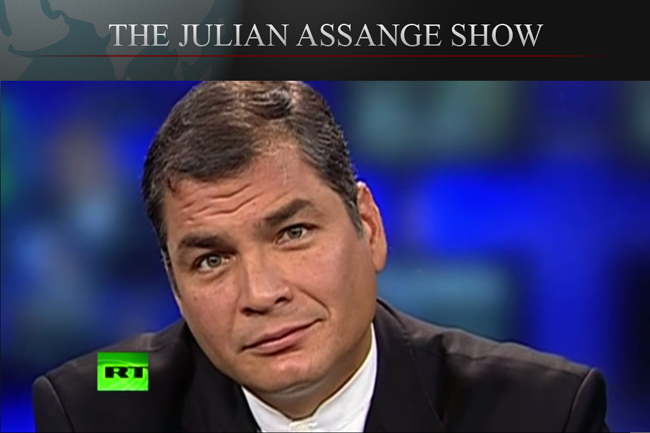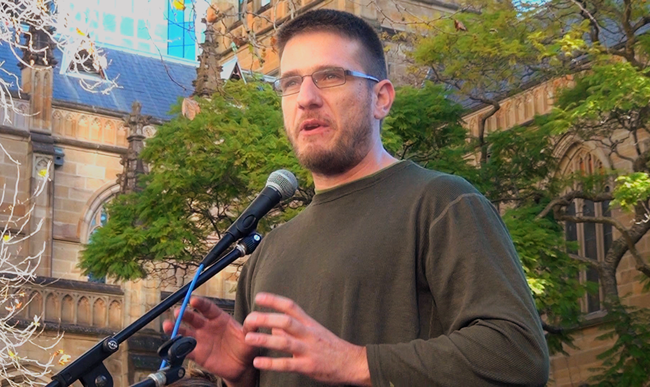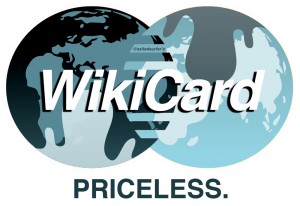For Fred Fuentes, spokesman of the Latin American Social Community in Sydney, there is no doubt that Julian Assange’s life is in danger, without the help of President Rafael Correa and the Ecuadorian government. He suggests however, that the government itself will be needing support. On the one hand Correa is looking at pressure from the US to hand over Assange if it opens its sealed indictment. Diane Feinstein’s recent call for Obama to prosecute for espionage, plus open acknowledgement now of the Wikileaks grand jury investigation, would suggest that the call may even be overdue. Remarks from the Julian Assange Defense Fund lawyer Susan Benn suggest that if Assange were already imprisoned in Sweden, the indictment would now be unsealed, given that his incarceration is a necessary pre-requisite to this move being made.
On the other hand, the Ecuadorian government has had its own internal struggles with aggressive, private media organisations, which the President claims are backed by powerful members of the Opposition. In his interview with Julian Assange on “The World Tomorrow”, Correa explains:
“The media here are the property of six families. They bequeath it to their children, and then the children might be completely ignorant and they become the editors of the newspapers. So, here we have a problem between private business that find… that seeking profit on something as important as the media, and then we wanted… One, to make sure that this information is made a public service very ethically, very carefully – and this is exactly what is missing in Latin America and in Ecuador, and we are trying to change this. For more than two years we are discussing a new Communications Law in order to release to you the radio electric spectrum – so for television, radio – so that one-third of it can be private with profit margin, and the other third will be communitarian but without profit aims, and the other one will be public – not only the central government… local government, municipalities, parishes, districts – we have had two years discussing.”
If granted asylum, Assange could be a powerful ally for Correa, providing a credible alternative to the corporate media giants. He already offers constructive advice to the President during the interview:
“We have seen this again and again – that big media organisations that we have worked with, like the Guardian, El País, New YorkTimes and Der Spiegel, have censored our material – against our agreements – when they published it for political reasons or to protect oligarchs, like Tymoshenko from the Ukraine, who was hiding her wealth in London, or big corrupt Italian oil companies operating in Kazakhstan. We have proof of this because we know what the original document contains and we can see what they printed and we can see what they have removed. But it seems to me that the correct approach to deal with monopolies and duopolies and cartels in a market is to break them up, or to make it so it is very easy for new publishers to enter into the market. Shouldn’t you create a system that protects the ease of entry into the publishing market so that small publishers and individuals are protected and have no regulation, and that these bigger publishers are broken up or are regulated?”
They seem to be on the same wavelength:
“This is exactly what we are trying to do, Julian.”
A glimmer of hope that this collaboration could work comes with Wikileaks winning the case in Iceland last week against Valitor, formerly VISA, who were ordered to unblock donations to Wikileaks or pay a fine of 800 000 ISK daily. Coupled with another opening via France’s Carte Bleue, who are contractually prohibited from blocking merchants, we may see a re-building of Wikileaks capital in the near future and the organisation growing strong again. One might even take the resolution of The Guardian to cease its “embarrassment campaign” against Assange, and key journalist David Leigh’s resolution to campaign in favour of Assange’s asylum as a sign that the tides are turning. Says Leigh:
“I’m convinced: it would be a good idea to give Julian Assange asylum in Ecuador, and I am going to campaign for it.”
-
After two years of full frontal attack on Assange and the “accidental” publication of the Cablegate live password, which obliged Wikileaks to release the entire trove in a format that was not just accessible to intelligence agencies, Leigh may have had a change of heart, and genuinely believe that Assange “has suffered enough”.
David Leigh might even be in favour of the 2008 constitution of Ecuador, which states that media outlets must not be run by bankers or those with other business interests, and he may deem that Assange can play an exemplary role here in breaking corporate control of media. Or he may want access to the Syria Files database, for whatever reason, and has to play nice again. Or he might just be trolling to get rid of a major competitor. Who knows? Maybe Glenn Greenwald will shed some light one day.
A big birdie might even have whispered in someone’s ear that it’s more convenient to let the crazy, white-haired dude “defect”. Ecuador now does a lot of it’s trade with China and Russia, and they’re definitely not interested in accommodating US bases… Nor is ALBA (Alianza Bolivariana para los Pueblos de Nuestra América), of which Ecuador is one of the member countries, even interested in using the US dollar any more as its currency, having introduced the SUCRE, initially as a virtual currency, some years back. Facing pressure in an election year from many of his opponents to resolve the Wikileaks ‘National Security’ issue, the US President may find it easier to have Assange effectively out of reach.
Whatever… as long as everyone agrees to respect the sovereign decision of Ecuador, Assange may cease to be a problem for one President, and a welcome Defensoria del Peublo for another. It is obvious why Julian chose Ecuador, and not just because of their independence from the US. This is the first country in the world that has granted rights to nature and the ecosystem. It has also declared the “right to food” as a Human Right, and values ‘life before debt’. Its new constitution aims towards assuring the integrity of food supplies over profit, and economic equality among citizens.
The actions Ecuador has taken in the last 4 years to eliminate corporate, governmental and judiciary corruption have been exemplary, and its respect for the environment and bio-diversity second-to-none. This nation respects liberty, enlightenment, freedom and truth. This nation respects and needs Wikileaks. What more could Mr Assange hope for?
.
[Full transcript of Fred Fuentes' speech at the Wikileaks rally, Sydney July 15, 2012]
“Like many of you when we woke up that morning to hear the news that Julian Assange had sought asylum in the Ecuador Embassy, we as a Latin America social forum, a coalition of Latin American Community Groups and solidarity activists from countries such as Chile, Uraguay, Venezuela, El Salvador, Nicaragua, we knew we had to respond immediately and there were two reasons for that.
The first was that we have no doubt that Julian Assange’s life is in danger. We know that we can expect nothing of this current Australian Government to defend his rights. They were rushing over themselves to accuse him of being guilty. They didn’t know what he was guilty of, they just knew that he was already guilty. The Federal Police had to then tell them that he had actually committed no crime and yet the persecution of Julian Assange by the Australian Government continues.
Julian knew that, and he knew he had to find asylum somewhere else. We are also absolutely 100% sure he will get no help from the US Government. As Latin American solidarity activists we know of the long history of attempts to silence, assassinate, kill individuals and entire peoples that have tried to rise up against US Imperialism, against the role of the US in Latin America. Military dictatorships that have come on the backs of ten of thousands of people being killed, all of them funded by the US, why on earth wouldn’t they want to get Assange?
I think Rafael Correa in his interview with Julian Assange summed it up very nicely as to why the US hates Assange so much, ‘cause he raised an old story that has been mentioned by other Latin American Presidents and they have asked the question; well, why is it that a military coup has never happened in the US? The simple answer is that there is no US Embassy in Washington. When you reveal the truths of what the American Embassies are doing in Latin America and all over the world, you can rest assured that the US Government will come for you.
But we also knew, as well, that we have no faith in the Swedish Government to do anything and we have a very specific case study as to why we do not trust the Swedish Government in any way to protect the rights of Julian Assange and I tell a story of a journalist Jakim Paris Petera. He was a journalist in Columbia, lived in Columbia, and was an elected Councillor of the left wing group called the ‘Patriotic Union’. Because of the threat this party represented, 4,000 of their members were killed. He went into exile. He picked Sweden as his country of exile. He has lived there for the last twenty years, he has his family there, he is a Swedish citizen. Today this journalist is in a Colombian gaol and the Swedish Government is doing nothing to protect this journalist, a journalist that had to flee from Columbia and is now facing supposed charges of terrorism.
What is the Swedish Government doing for its own citizen? Nothing. What can we expect them to do for Julian Assange? Much less…and we also knew we had to respond not just to defend Assange but to defend Ecuador because we knew immediately as soon as he was in the Ecuadorian Embassy, that they would also use this to attack Ecuador as they have already been doing for a number of years, as so it began in the media.
The Ecuadorian Government, why in the world would Assange pick the Ecuadorian Government, which apparently, has one of the worst records in regards to freedom of speech? Well, we really know when the corporate media talks about of freedom of speech, what they’re really talking about is their ability to control what is able to be said and not heard. The Ecuadorian Government is leading the way in breaking down this corporate power. When Correa came to power, five of the seven major newspapers were owned by banking corporations and as you can image there might be a slight conflict of interest that occurred when you both own a bank and a newspaper in the global economic crisis, but also a banking crisis that happened in Ecuador in the nineties.
What did the newspapers do then? They reported nothing about the banking crisis, they in fact signed a deal which is revealed by WikiLeaks, because of the US Embassy cables, where these banking corporations and newspapers sat down and said we will not report any of this, that way none of our interests are touched. Well, the Ecuadorian Government and its people have drafted up a new constitution. In that new constitution if you are a banker you are no longer allowed to own any media outlets. That’s a pretty important start I think in breaking down the power of the corporate media.
But that wasn’t enough, because a few years later they held another referendum to further amend the constitution and now the constitution reads that anyone who is involved in the media industry are not allowed to have any other business interests anywhere else because once you do start to have other business interests (maybe someone like Gina Rinehart) this is obviously going to become an issue when you come to report on that. So, I think there is a very clear reason why they want to get Assange, I think that’s the reason they are going to attack Ecuador, that’s why it is so important that we are here today to both support Assange but I do want people to also show support with the Ecuadorian Government.
Let’s show them that millions of people around the world are willing to support them if they take the defiant stand of basically saying to the US, we don’t care, we are going to defend Assange, we’re going to give him asylum. We know we need to do that, we need to continue to do that, but I think we need to do one more thing as well. We need to take the lessons of governments like Ecuador and others around the world and use that information that WikiLeaks has made available to us, to really begin to fight for real change, because that information is only powerful when people like ourselves take that into our hands and make use of that information in order to fight for a better world. I think I would like to finish up by congratulating the organisers of today and congratulating everyone here and let’s hope that we can continue to build our campaign to defend Assange, to defend Ecuador! and to fight for a better world we all want to see.”
Transcription: @gailymalone






Hej.Kan jag inte beskriva hur lever i Ecuador samtidigt vilken politisk,kan man säga svår och inte lätt.Men inte missförstå mig också honom Julian Assange.Var inte så inblandad i mellan sexläggning som skandal med politisk,egentligen sexuall tillhör inte politisk för att helt annan sak som privat liv absulot inte gräva upp hans privat liv!!!Allra först ge honom fria som lidande politisk skäl är berättigad stöd honom,betyder aldrig hurudan är Julian Assange,huvudsakligen han är inte kriminellt!Ge honom politisk asyl till Ecuador som möjligt